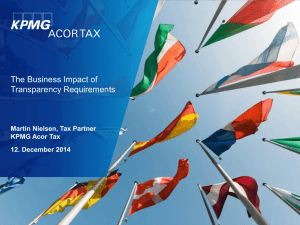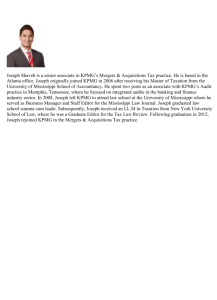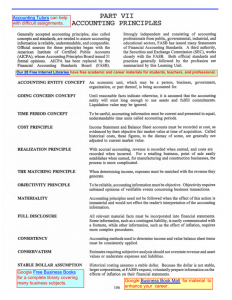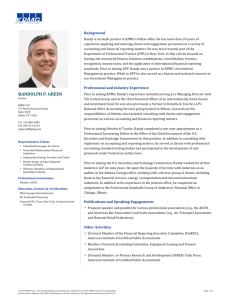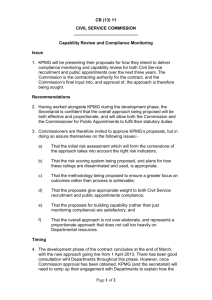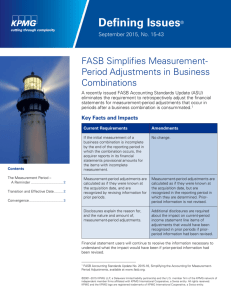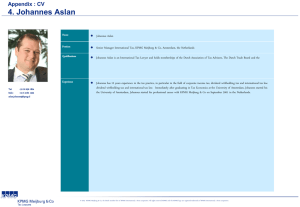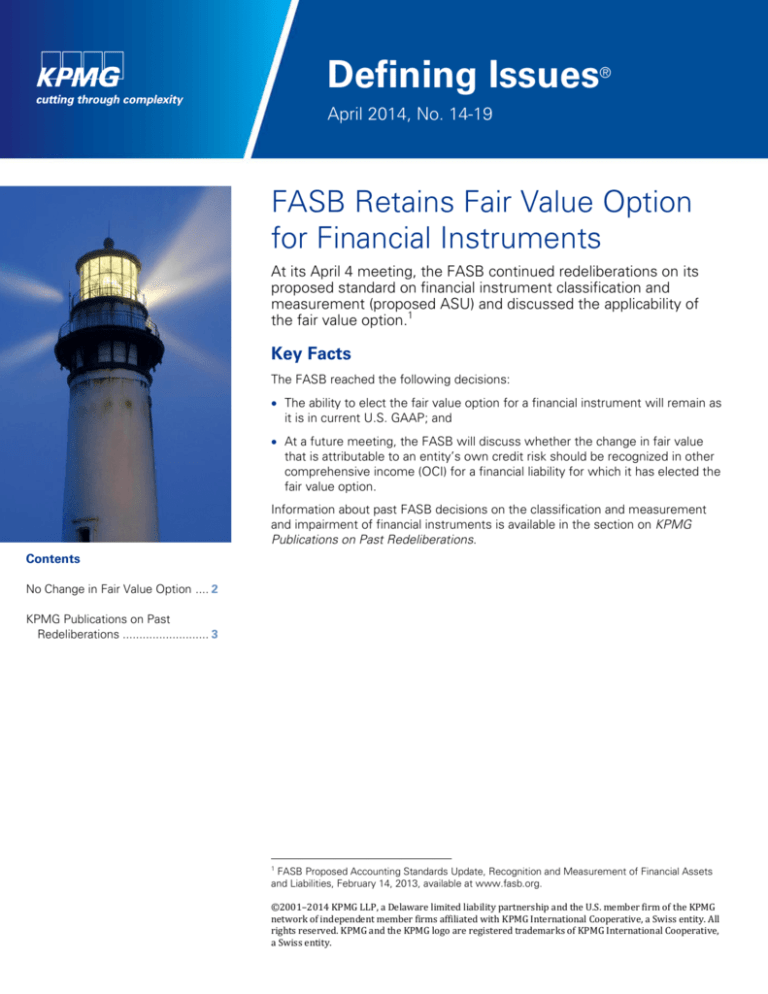
Defining Issues
®
April 2014, No. 14-19
FASB Retains Fair Value Option
for Financial Instruments
At its April 4 meeting, the FASB continued redeliberations on its
proposed standard on financial instrument classification and
measurement (proposed ASU) and discussed the applicability of
the fair value option.1
Key Facts
The FASB reached the following decisions:
The ability to elect the fair value option for a financial instrument will remain as
it is in current U.S. GAAP; and
At a future meeting, the FASB will discuss whether the change in fair value
that is attributable to an entity’s own credit risk should be recognized in other
comprehensive income (OCI) for a financial liability for which it has elected the
fair value option.
Information about past FASB decisions on the classification and measurement
and impairment of financial instruments is available in the section on KPMG
Publications on Past Redeliberations.
Contents
No Change in Fair Value Option .... 2
KPMG Publications on Past
Redeliberations .......................... 3
1
FASB Proposed Accounting Standards Update, Recognition and Measurement of Financial Assets
and Liabilities, February 14, 2013, available at www.fasb.org.
©2001–2014 KPMG LLP, a Delaware limited liability partnership and the U.S. member firm of the KPMG
network of independent member firms affiliated with KPMG International Cooperative, a Swiss entity. All
rights reserved. KPMG and the KPMG logo are registered trademarks of KPMG International Cooperative,
a Swiss entity.
Defining Issues® — April 2014, No. 14-19
No Change in Fair Value Option
The FASB decided that the ability to elect the fair value option for financial
instruments will remain as it is in current U.S. GAAP. At a future meeting the
FASB will discuss whether the change in fair value that is attributable to an
entity’s own credit risk should be recognized in OCI for a financial liability for
which it has elected the fair value option.
Rede
Clas
of Fi
Background and Observations. The fair value option under current U.S. GAAP
allows an entity to irrevocably elect to measure a financial instrument at fair
value and recognize changes in net income (FV-NI). This election is applied on an
instrument-by-instrument basis and must generally be made upon initial
recognition of the financial instrument.
The proposed ASU, including prior redeliberation conclusions, would have
eliminated the unconditional fair value option in existing U.S. GAAP and instead
permit an entity to elect (irrevocably and at initial recognition) to measure at FV-At its Fe
the prop
NI the following assets and liabilities:
measure
A group of financial assets and financial liabilities if an entity both manages the
characte
net exposure relating to them on a fair value basis and provides information on
assets.1
a net exposure basis to the entity’s management.
A hybrid financial asset or liability that contains an embedded derivative
feature otherwise requiring bifurcation and separate accounting.
Key Fa
The FASB
Financial assets that otherwise would be measured at fair value through OCI.
A cash f
At the April 4 meeting, the FASB decided to retain the fair value option as it
classific
stands under current U.S. GAAP because of the project’s current direction and
ensure t
lack of obvious practice issues. However, this tentative decision could change in
measure
the upcoming discussion on financial liabilities for which an entity has elected
The fair
the fair value option.
an embe
Contents
Cash Flow Characteristics ............ 2
We previo
and measu
Fair Value Option for Hybrid
Financial Assets.......................... 2
1
FASB Propo
and Liabilities
2
For more in
for Classifica
IFRS Conver
Instruments,
Measuremen
network.
©2001–2013
2
©2001–2014 KPMG LLP, a Delaware limited liability partnership and the U.S. member firm of the KPMG
network of independent member firms affiliated with KPMG International Cooperative, a Swiss entity. All
rights reserved. KPMG and the KPMG logo are registered trademarks of KPMG International Cooperative,
a Swiss entity.
Defining Issues® — April 2014, No. 14-19
KPMG Publications on Past Redeliberations
Information about the proposed ASUs on classification and measurement and
impairment and the FASB’s previous tentative decisions can be found in the
following Defining Issues articles.
Financial Instruments: Changes to Financial Assets Impairment, Classification
and Measurement (14-14)
Rede
Redeliberations Continue on Impairment of Financial Instruments (14-12)
Clas
Divergence Increases on Classification and Measurement of Financial Assets
(14-5)
of Fi
Redeliberations Continue on Classification and Measurement of Financial
Instruments (14-13)
IFRS Convergence Not Probable on Impairment and Classification and
Measurement of Financial Instruments (13-56)
At its Fe
the prop
Redeliberations on Financial Instruments Classification and Measurement – measure
Business Model Assessment (13-53)
characte
assets.1
Redeliberations Begin on Impairment, Classification and Measurement of
Financial Instruments (13-43)
Additionally, more detailed information is presented in these Issues In-Depth
articles.
Key Fa
The FASB
Applying the FASB Proposed Model for Classification and Measurement of A cash f
Financial Instruments (13-2)
classific
ensure t
Applying the FASB Proposed Model on Financial Asset Credit Losses (13-1)
measure
The fair
an embe
Contact us: This is a publication of Contents
KPMG’s Department of Professional Practice
We previo
212-909-5600
and measu
Cash Flow Characteristics ............ 2
Contributing authors: Enrique M. Tejerina and Michael A. Gaiso
Earlier editions are available at: http://www.kpmginstitutes.com/financialFair Value Option for Hybrid
reporting-network
Financial Assets.......................... 2
Legal–The descriptive and summary statements in this newsletter are not intended to be a substitute for
the potential requirements of the proposed standards or any other potential or applicable requirements
of the accounting literature or SEC regulations. Companies applying U.S. GAAP or filing with the SEC
should apply the texts of the relevant laws, regulations, and accounting requirements, consider their
particular circumstances, and consult their accounting and legal advisors. Defining Issues® is a
registered trademark of KPMG LLP.
1
FASB Propo
and Liabilities
2
For more in
for Classifica
IFRS Conver
Instruments,
Measuremen
network.
©2001–2013
3
©2001–2014 KPMG LLP, a Delaware limited liability partnership and the U.S. member firm of the KPMG
network of independent member firms affiliated with KPMG International Cooperative, a Swiss entity. All
rights reserved. KPMG and the KPMG logo are registered trademarks of KPMG International Cooperative,
a Swiss entity.

